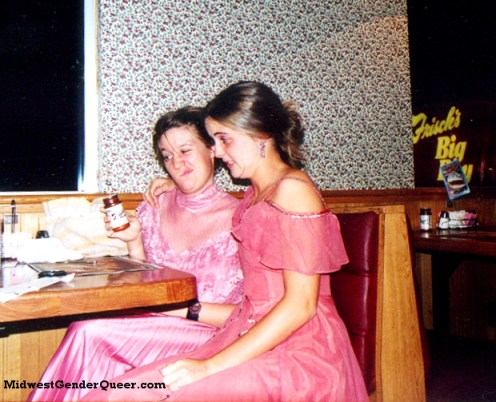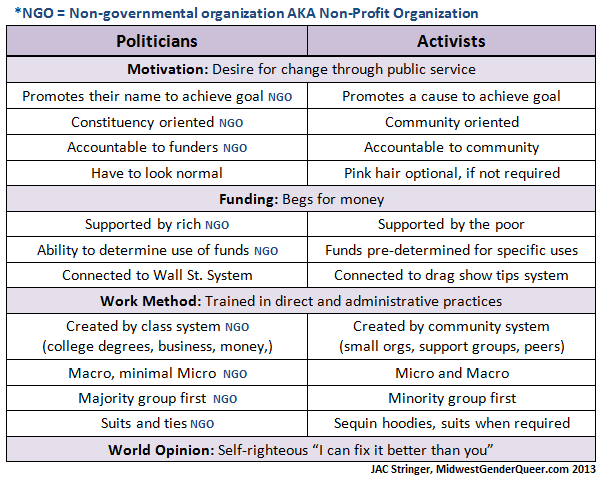I can appreciate that cis people are interested in supporting Bruce Jenner. I also can appreciate that the attention brought on by Bruce’s coming out brings further visibility to trans people. That said, as the media circus swirled over the weekend, so did my frustrations. Cisgender (cis) people have been doing pretty well with trans identity politics recently, but in the last couple days something went awry.
A cis ally is someone who has some level of knowledge about the trans community and proactively builds solidarity with trans people. We know that there is no right or wrong way to be trans but sometimes our community extends that philosophy to say there is no right or wrong way to be an ally. This surely comes from our people’s desperation for support and recognition. In other words, we take whatever we can get with an obligated gratitude. I rarely abide by this practice which has given me the reputation of being “mean” or “impatient.” (Perhaps those who call me “mean” have not seen me spend hours patiently educating offensive, but well intentioned cis people all with an impenetrable supportive smile.) Contrary to popular belief, it is possible for trans people to appreciate cis efforts for solidarity while also addressing problematic behavior. Supportive education is my general practice, focusing on strengths. I try to avoid value-loaded words like “right” and “wrong” and use strength based language like “a better word would be…” or “a more positive way is…” It’s also to be expected that education will look different depending on who is being taught. If you are brand new to trans stuff, then I’ll be very patient and gentle. If you’ve been working with trans topics for years, my method is going to be more direct saying, “I respect your ability to comprehend this at a higher level so let’s be polite, but real.” Then there are times when an issue is so large, it is necessary to address the cis community as a whole. Every situation requires careful strategy, and sometimes that strategy is simply saying, “No, you’re doing it wrong.”
To help our cis friends along, I have compiled a list of ten reminders for cis people when trans identities become a focal point in the news:
1) You do not have the right (or ability) to comment on or describe the significance of coming out as trans. It is not ok to offer your opinions on how trans people experience ourselves or what it is like to be trans. If you aren’t trans, you don’t know what it is like. You can be supportive without trying to speak for us.
2) Be prepared for trans people to challenge your self-titled allyship or the “trans ally” hashtag in your posts about a white famous person coming out when trans people (namely, trans women of color) are murdered every day and you never say a damn thing about it, with or without a hashtag. #youredoingitwrong
3) There is a difference between following the nice-person-politic internet herd and being an active participant in the trans movement. Trans people do not need cis validation of our joys or sorrows. We need solidarity and cis advocacy. Ask yourself, how often do you read about trans stuff when we are not in pop culture headlines? Are the only trans related posts you make about the death of a trans person? Are you tagging #translivesmatter about white trans people without acknowledging that it is an adaptation/appropriation of #blacklivesmatter? Solidarity requires more than a mouse click or a hashtag; it requires consistent buy-in, socially just education, and speaking out in real life. You do not get extra ally points for every trans post you reblog on tumblr.
4) If you only talk about the trans community when the news is about a white trans person, you are embodying one of the most damaging and pervasive oppressions trans people experience: racism.
5) If you hear yourself say, “The race of a trans person doesn’t matter because trans oppression has nothing to do with race,” just stop because you’re doing everything wrong.
6) Don’t assume trans people are interested in talking to you about trans news or want to hear how brave and magical you think we are. There are ways to honor the trans movement without tokenism and it is cis people’s responsibility to learn how. If you feel the need to bring up an issue, consider whether it is appropriate. “Hey, I heard about that person’s death…” is not appropriate conversation for crossing paths at the doughnut shop. A better statement is, “I appreciate the work you are doing.” Trans people are not responsible for providing unconditional edu-tainment for cis people; We have more important things to do like live our lives, fight oppression, and try to survive past the age of 30. If you blame, shame, or judge a trans person because they chose not to educate you or you felt offended by their response, you’re doing your “allyship” wrong. The first, most important step in allyship is taking a step back.
7) It is not ok to send/post sensationalized trans related articles to a trans person to demonstrate your solidarity. Doing this can not only be a trigger and/or out someone; the article could realistically be about the death or injury of someone we know and your well intentioned “sharing” can create devastating results. Furthermore, do not interpret a trans person’s internet silence as not knowing about or ignoring a news story. Believe me, we know, and probably knew before you did. We may not post about it because the news language may conflict with our values; we could be too angry to speak; we may be grieving. We are likely not posting as part of our self-care and we are often processing the event offline with other trans people. If you are concerned for a friend, a better option is to check in privately and offer support (note that support does not include interview questions – see #6).
8) Do not connect every event about a living trans person to a trans person who has died. It can be meaningful to hear a cis person say, “I care about trans rights.” It may be less meaningful to hear, “I care about trans rights because “person X” died.” When someone says that to me all I can think is, “Well, a lot of people died before that person… and thanks for only caring if we are dead.” Then, inevitably, the trans person becomes responsible for comforting the cis person in their sadness over our oppression. If you want to talk about trans rights, recognize that we are more than headstones and news stories. We live and breathe and some of us have to work hard to ensure we continue doing that. Focus your conversations on our fight, not our deaths.
9) Do not make jokes about us. Do not make jokes about our bodies, our names, our appearances, or our identities. To not claim that it is “all in good fun” and defend transphobic humor by saying you “make fun of everyone.” There is a difference between stating a celebrity is “dramatic” and making a food product represent a trans person’s disembodied genitals. This kind of humor is rooted in the same transphobic oppression that causes us to be murdered. Recognize that your humor is a form of violence, and when you do, educate your peers (or your customers) on why you are changing your behavior. If you apologize for a cruel joke, but do nothing to stop the room from laughing, you’re doing your apology wrong.
10) Listen to trans people. I repeat: Listen to trans people. Many trans people need every ounce of our time and energy to focus on our survival and the survival of our people. If one of us makes an effort to educate you, be grateful that we are offering our precious resources. Be thankful that a trans person trusts you enough to share our feelings. Trans people face harassment and oppression countless times every day. You may only be corrected by a trans person once or twice in your life. Recognize the rarity of what you are receiving; we would not address something if we did not feel it was important. Lean into it and use it to grow. A call out is not an attack; it is a sign of respect and a desire for solidarity. Listen to trans people and respond with humility and gratitude.
No one likes to be told they’re wrong, even as a clever running gag to break up the heaviness of a pretty serious series of call outs. Call outs are hard. You might feel hurt; compare that how much it hurts us to experience the oppression you accidentally embodied. You might think we are being mean; to us, your behavior is beyond mean – it is cruel and exhausting. Is it not fair and just for a trans person to draw attention to behavior that promotes our oppression so it can be corrected? Is it fair for cis people to insult and belittle us for standing up for ourselves? This is not about you; it is about the impact your words and actions have. The most important thing to remember is that intent is irrelevant. When I am teaching classes, I describe privilege like dancing. If you are busting a move with a friend and then accidentally hit them in the face, you friend has a right to be displeased because they just got hurt. They may tell you, “Hey, don’t dance like that because you hurt me.” You can get mad; you thought the move was going to be awesome and you didn’t mean to hit them… You could get embarrassed and run away, leaving your friend alone in their injury. You could ignore it; it’s not your fault they got in the way. Or you can say, “I’m sorry. It was an accident, but that doesn’t stop you from being injured. I’ll rework my dance so it doesn’t hit you or anyone else in the face.” We all make mistakes; no one can do everything right (including us magical trans people). But once you receive feedback on your mistakes, even if it hurts, you can work to do better. It’s time to do better. We have come far enough in this movement that it is fair to expect cis allies to get it right and to take responsibility when you don’t. Until that becomes a reality, expect that sometimes you’re going to be reminded when you’re doing it wrong. Use it, because then you’ll start to do it right.














